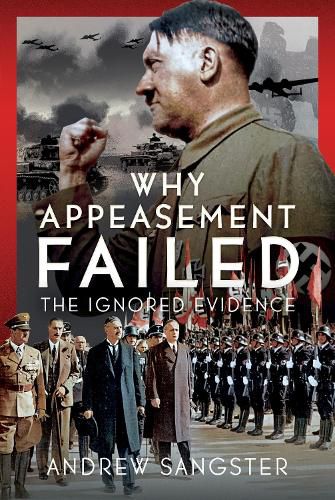Readings Newsletter
Become a Readings Member to make your shopping experience even easier.
Sign in or sign up for free!






In the years leading up to the Second World War, the world focussed heavily on Nazi Germany's growing military power, but few grasped the true danger of Adolf Hitler and his regime. Why Appeasement Failed argues that the critical insight into Hitler's intentions was already available, yet largely ignored. The author starts by examining the turbulent political climate of the 1930s, the tensions with Germany and the issues between the French and the British, as well as the Munich Conference and its successes and failures. Drawing attention to the overlooked warnings in Mein Kampf and several publications from the 1930s, this book reveals that these texts clearly outlined Hitler's vision for expansion and conquest long before it became a global reality. Mein Kampf made sinister references to what Hitler called defective people, namely, both mentally and physically handicapped, and his racist obsession. He dwelled on the Party's philosophy, propaganda, and projected a unified pan-Germany based on military power - evidence that should have sounded alarm bells but was dismissed. Attention that moves to an outstanding but neglected book published in Germany in 1937 written by an Australian academic investigating 1936 Germany. While appreciated by some, the findings were dismissed by Chamberlain. In places, this writer's almost prophetic forecasts read almost like a post-war analysis of the situation. He met most Nazi leaders, studied the political paramilitary, the German Army and attended a Nuremberg rally. Having studied German economics, he saw for himself the indoctrination of Nazism from the schools to Hitler Youth, to young men in the Labour Service all trained in military discipline. He observed that the public mind was controlled, and the laws changed to suit Nazism. Had political leaders paid closer attention to these early clues, they might have heeded Winston Churchill's urgent call to rearm. Why Appeasement Failed sheds light on the missed opportunities to understand and counter the Nazi threat before it was too late. AUTHOR: Andrew Sangster has six degrees, in Law, Theology and four in history including his doctorate. An ordained priest, he has trespassed away from the Church to teaching and the study of history. He has taught in grammar schools and at Eton College, was a headmaster for some nine years and has assisted post-graduate students of history. He has more than twenty published history books both in the United Kingdom and overseas with some co-authored with Pier Paolo Battistelli, the well-known Italian historian. When not called for Church duties he studies the lesser-known aspects of modern history and plays chess for relaxation. 21 b/w illustrations
$9.00 standard shipping within Australia
FREE standard shipping within Australia for orders over $100.00
Express & International shipping calculated at checkout
In the years leading up to the Second World War, the world focussed heavily on Nazi Germany's growing military power, but few grasped the true danger of Adolf Hitler and his regime. Why Appeasement Failed argues that the critical insight into Hitler's intentions was already available, yet largely ignored. The author starts by examining the turbulent political climate of the 1930s, the tensions with Germany and the issues between the French and the British, as well as the Munich Conference and its successes and failures. Drawing attention to the overlooked warnings in Mein Kampf and several publications from the 1930s, this book reveals that these texts clearly outlined Hitler's vision for expansion and conquest long before it became a global reality. Mein Kampf made sinister references to what Hitler called defective people, namely, both mentally and physically handicapped, and his racist obsession. He dwelled on the Party's philosophy, propaganda, and projected a unified pan-Germany based on military power - evidence that should have sounded alarm bells but was dismissed. Attention that moves to an outstanding but neglected book published in Germany in 1937 written by an Australian academic investigating 1936 Germany. While appreciated by some, the findings were dismissed by Chamberlain. In places, this writer's almost prophetic forecasts read almost like a post-war analysis of the situation. He met most Nazi leaders, studied the political paramilitary, the German Army and attended a Nuremberg rally. Having studied German economics, he saw for himself the indoctrination of Nazism from the schools to Hitler Youth, to young men in the Labour Service all trained in military discipline. He observed that the public mind was controlled, and the laws changed to suit Nazism. Had political leaders paid closer attention to these early clues, they might have heeded Winston Churchill's urgent call to rearm. Why Appeasement Failed sheds light on the missed opportunities to understand and counter the Nazi threat before it was too late. AUTHOR: Andrew Sangster has six degrees, in Law, Theology and four in history including his doctorate. An ordained priest, he has trespassed away from the Church to teaching and the study of history. He has taught in grammar schools and at Eton College, was a headmaster for some nine years and has assisted post-graduate students of history. He has more than twenty published history books both in the United Kingdom and overseas with some co-authored with Pier Paolo Battistelli, the well-known Italian historian. When not called for Church duties he studies the lesser-known aspects of modern history and plays chess for relaxation. 21 b/w illustrations